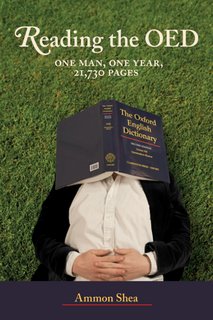|
Reading the OED: One Man, One Year, 21730 Pages by Ammon Shea Published by Perigee Trade 240 pages, 2008
|
Journey for a Wordarian Reviewed by Diane Leach
I planned to begin by writing that Ammon Shea’s Reading the OED is THE book for word lovers. I ran to look up the word for word lovers (lexiphiles? vocabularians?) but immediately ran into what I always called “the dictionary problem.” That is, if you don’t know the word, or know it but cannot spell it, you’re out of luck. Thanks to Ammon Shea, I now know the technical term for my the dictionary problem is onomonomatia: vexation at having difficulty in finding the right word. If you are true wordarian, or whatever, there is the OED online, which will solve this problem for you via its search engine, provided you are willing to subscribe. Or you may follow Ammon Shea’s example. Wordarian to end all wordarians, Shea read the Oxford English Dictionary cover to cover, the way others might take on Swann’s Way. Caveat Emptor: The Oxford English Dictionary runs 21,730 pages, requiring 20 volumes. The set weighs 137 pounds. Start making shelf space, and working with free weights, now. But don’t let the OED’s sheer heft stop you -- Shea claims reading it was immeasurably enriching, and if his wonderful book is any example, it will be for you, too. Though it must be said that Shea lives with a woman who once worked as a lexicographer for Merriam-Webster. The couple share an apartment stuffed with dictionaries, and keep them lying around the way others strew television remotes and tissue boxes. Still not convinced? Still think Reading the OED is a fringe book for weirdos? OK, well, yes, if you consider people who are really into words weirdos, people who love words like earwig, nonchalance, or exsanguinate because they look and sound really cool (me, not Shea), then yes, this is a book for weirdos. Read it anyway. You’ll have a blast. Divided into 26 wordacious chapters -- yep, that’s A-Z -- the book is both an examination of some fine words and a meta-examination of reading dictionaries. It’s also hysterically funny: David Sedaris, laugh-out-loud-on-the bus funny. I myself finished the book at home, where Shea’s definition of Xenium sent me into hysterics, alarming both my husband and the cat, who cannot discern laughter and tears. The poor kitty crowded my lap, meowing urgently as he stepped on Shea’s book, inducing further hysteria. For the record: “Xenium: (n.) A gift given to a guest. “It is a very delicate balance to strike, this business of giving a gift to someone you do not want to offend and yet whom you also do not want to stick around too long. Unless you are one of those unbalanced individuals who actually enjoys having company, I would recommend giving a xenium [italics the author’s] such as a pair of used socks, something that says ‘Here is a gift -- please go away.’” This leads me to Shea himself, a man whose immersion in the world of dictionaries is described in a delightfully economic writing style. Though he claims reading the OED for hours on end often rendered him incapable of simple speech, his sufferings are not evident on paper. He also describes crushing headaches, back pain, and the renewed need for glasses, all symptoms middle-aged bibliophiles, whatever their reading material, can empathize with. In my quest to convince you that Reading the OED is an essential addition to your bookshelf, I offer the following list of words from said book:
Shea also allows his inner twelve-year-old to surface, albeit in an erudite fashion, by offering several words relating to vomit. These new words have my brought my husband’s inner twelve-year-old great happiness. He is now using Keck (n., to make a sound as through one were about to vomit) in every third sentence. Consider Vomiturient (adj., characterized by a desire to vomit) the next time the feeling comes around, and enjoy Shea’s discourse on the prefix Be: “the act of throwing or projecting something unpleasant upon someone.” Several examples follow, including bevomit. There is nothing quite like finding oneself in a book about dictionaries. To wit: Anonymuncule: (n.) An anonymous, small-time writer. Best of all is the word you’ve always needed but never had. Gound, for my money, is the all-round winner: (n.) The gunk that collects in the corners of the eyes. Never again will I be reduced to calling it “eye gark.” Equally amusing are Shea’s library adventures. After trying out various reading spots, including parks filled with screaming toddlers, windy beaches and various libraries, he settles on the basement of the Hunter College Library, where he sits amid the French volumes, hoping his inability to read French will limit distraction. I was thrilled to read that he hollered at the students who talked in the library (Shea is a better person than I; my feelings about talkers in libraries are unprintable), then decided it was easier to rout them out by telling them rats were crawling into their bags. He also describes his fear of turning into one of the “library people,” that group of perhaps homeless, perhaps not, definitely shabby, usually silently unhinged types that populate all libraries. When he expresses his concerns to Alix, his girlfriend, she comforts him by noting the librarians probably think he is a library person. Finally, if you are the sort who begins worrying about Christmas presents in August, Reading the OED is the perfect gift for all the bibliophiles on your list. Not one will accuse you of giving a Toe Cover: (n.) A present that is both useless and inexpensive. | August 2008
Diane Leach lives in northern California with her husband and cat. She blogs at http://barkingkitten.blogspot.com. When not reading or writing, she regularly burns herself in the kitchen. |

